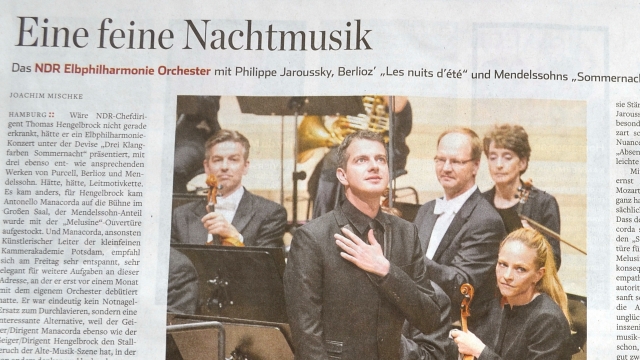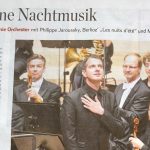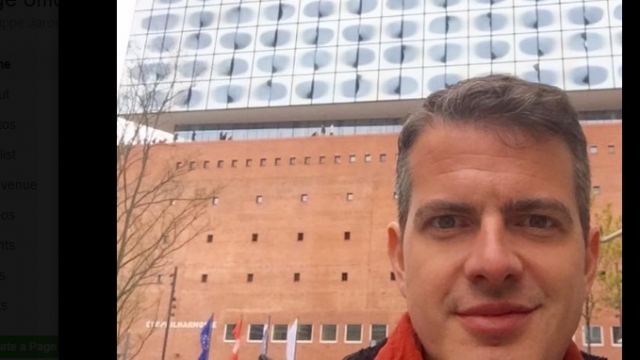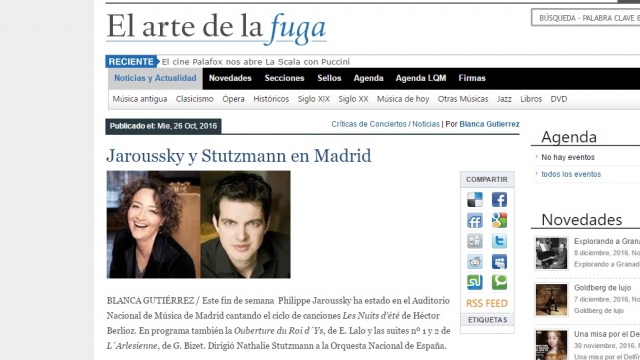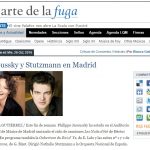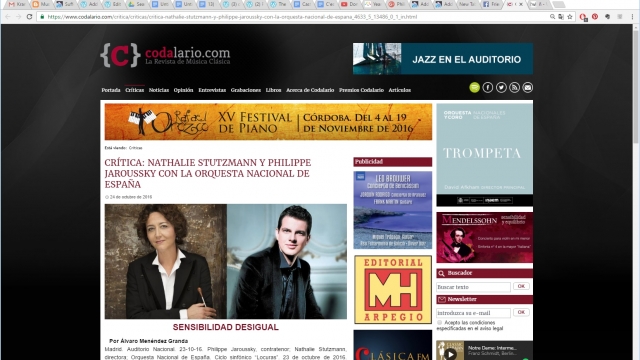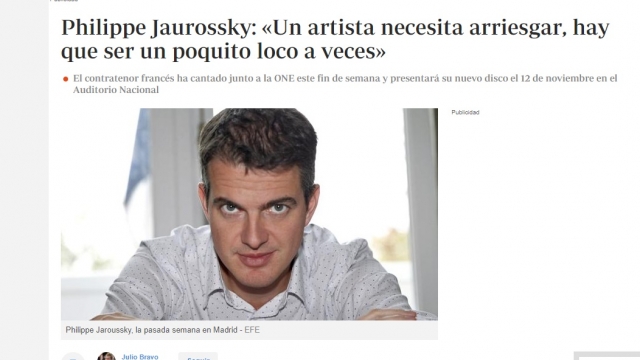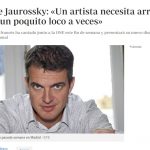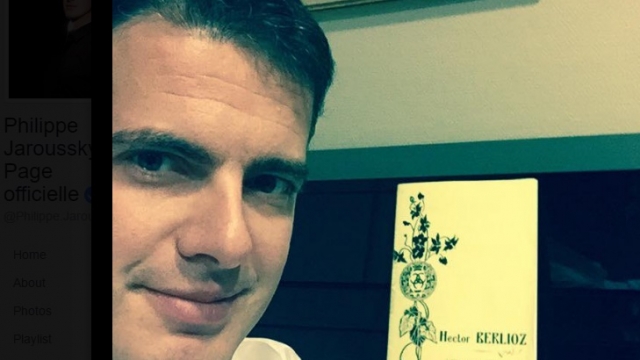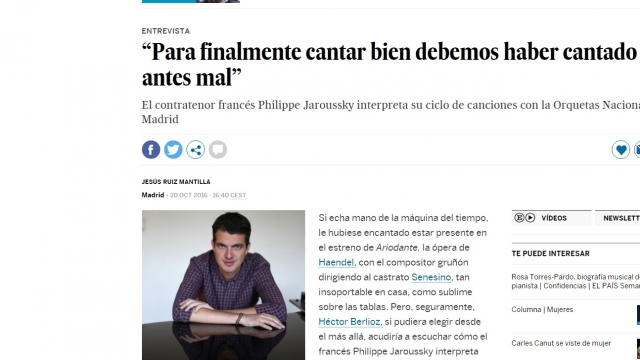2017-05-07, klassik-begeistert.de, by Leon Battran
“Philippe Jaroussky singt die Lieder in seiner Muttersprache wunderbar ätherisch und mit herausragender Textverständlichkeit. Sein Mezzosopran schwebt geisterhaft über dem Klanggrund des Orchesters. Seine Stimme lässt er erwachsen, erblühen und erstrahlen und überzeugt in allen Registern mit Wandelbarkeit und außergewöhnlicher Klangschönheit.” […] “Es ist die Wärme in der Stimme von Philippe Jaroussky, die berührt; die Aufmerksamkeit, die er jeder Note zuteil werden lässt. Er formt die Töne ganz ohne zu drängen oder zu pressen, mit behutsamer Leichtigkeit, als würde er Seifenblasen pusten. Und ebenso viele Farben spiegeln sich im Glanz dieser Stimme wider. Bravo, Monsieur! Cela, c’était superbe!”
*This is a fan translation. If you have any problems with this being online, drop us a line and we will remove it immediately.
Translation by Lankin*
Source/Read original: [x]
NDR Elbphilharmonie Orchester
Philippe Jaroussky Countertenor
Dirigent Antonello Manacorda
Felix Mendelssohn Bartholdy, »Das Märchen von der schönen Melusine« / Konzertouvertüre F-Dur op. 32
Hector Berlioz, Les nuits d’été
Felix Mendelssohn Bartholdy, Musik zu »Ein Sommernachtstraum« op. 21 und 61
Elbphilharmonie Hamburg, 5. Mai 2017
By Leon Battran
Even if, as a countertenor, Philippe Jaroussky appears to be predestined for it, it can’t always be repertoire for castrati. This evening, he is merely a mezzosoprano, interpreting Hector Berlioz’ “Les nuits d’été” – songs originating from the heart of the 19th century – and Philippe Jaroussky demonstrates beyond any doubt that he’s just as home in French Romantic music as he is in Baroque.
The Frenchman is “Artist in Residence” during the current season at the Elbphilharmonie. Already at the two inaugural concerts in January 2017, he had delighted with Italian vocal works from around 1600. The Berlioz songs originate between 1840 and 1856 and were originally designed for different voice types. Les nuits d’été (Summer Nights) is regarded as the first cycle of orchestral songs in music history, making Hector Berlioz the inventor of this genre. Spring awakening, young love and happiness are introduced just as well as pain of separation, despair, and death.
Philippe Jaroussky sings the songs in his native language, wonderfully ethereally and with outstandingly clear diction. Like a phantasm, his mezzosoprano wafts over the foundation of the orchestra. He lets his voice grow, blossom and shine, convincing through all registers with great versatility and exceptional beauty of sound. Jaroussky’s appearance is professional and extremely focused. Whenever some minute lapses in intonation want to sneak in, he immediately corrects them already at the onset.
In Berlioz’ songs, the singer navigates through idyll and melancholy: frolicing through spring meadows, gathering fragrant flowers of May, forlornly sailing the surging sea, and strolling through a moonlit cemetery. An equally dignified as well as fragile drama pervades the cycle, which the French countertenor renders particularly palpable.
The warmth in Philippe Jaroussky’s voice affects deeply, the attention he bestows on every single note. He forms his notes without any hint of coaxing or pressing, with gentle ease, as if he were blowing soap bubbles. And just as many colours are scintillating in the luster of this voice. Bravo, Monsieur! Cela, c’était superbe!
The audience is over the moon. There is applause after every piece. The enthusiastic audience even sticks to this pattern during the Instrumental Suite of Mendelssohn’s incidental music for “A Midsummer Night’s Dream.” The evening already started with Mendelssohn’s program music, to be specific, with his concert overture “The fair Melusina”; well proportioned musical poetry, crisply performed by the Elbphilharmonie Orchestra, providing a slim quarter of an hour of delicate enchantment.
Manacorda was at the baton. The Artistic Director of the Kammerakademie Potsdam stood in for Thomas Hengelbrock due to the latter’s illness. The Italian conducted the Midsummer Night’s Dream with reputable suppleness and verve, and somehow Italian. His conducting is very transparent, and positively pithy. Manacorda’s baton traces the music like with a paintbrush, sending a multitude of signals in various directions, swirls and atomises, tickling the musicians from afar or nudging them.
Particularly beautiful is the flowing intermezzo: the first part lyrical, elegant, beckoning; in the second part, changing to a rustic-style dance rhythm. The solo horn defrays the Notturno, in pastoral bliss. From then on, the music swells into greater drama, only to come to a rest on rocking sounds of the flute.
And then, at last, the famous trumpet fanfare, announcing: the wedding is about to begin! This wedding march comes along quite briskly, in a sporty-happy tempo, but at the same time festive enough to fit a New Year’s Eve concert. A single broad smile. There isn’t any better get-out dance. A last clang from the cymbals closes the what is probably the first summer night of the year in Hamburg.
Leon Battran, May 7, 2017, for
klassik-begeistert.de
Source/Read more: [x]



